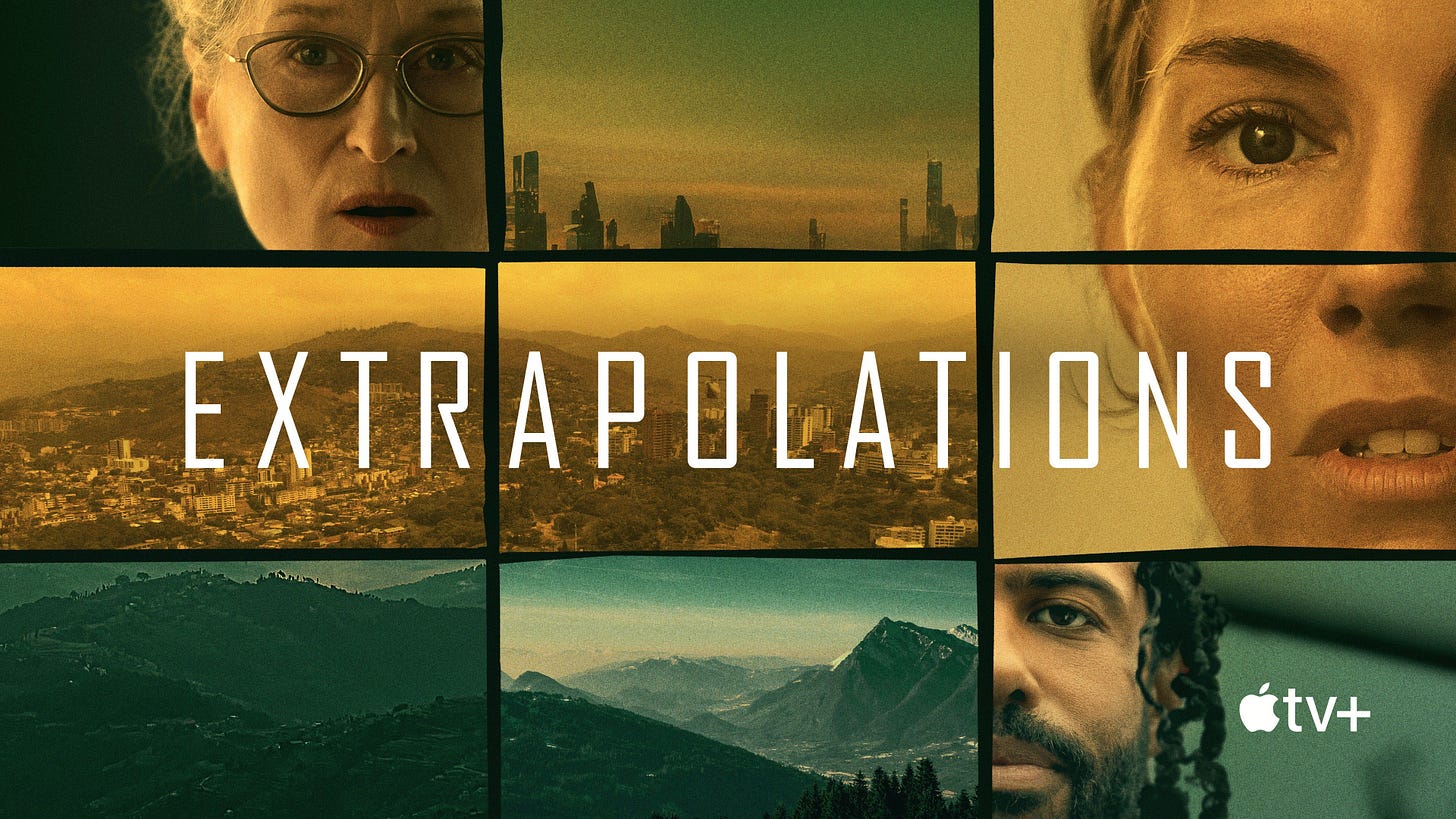Refugia Newsletter #39
Earth Day, clean energy aspirations, climate art, and the show Extrapolations
Refugia News
Happy Earth Day! The first Earth Day in 1970 is often cited as a moment that sparked the modern environmental movement. That same year, the Clean Air Act passed and the EPA was founded, among other things. We can look back a few years before 1970, too, and give some credit to writer Rachel Carson, whose landmark book Silent Spring appeared in 1962, raising awareness of the toxic chemical DDT. Hooray for writers who make a difference!
I hope you’re finding some meaningful way to observe the day. This afternoon, I will be giving my Shakespeare students their final exam, so I’ll miss the local march. But before that, I’m tuning into the United Church of Christ Earth Day Summit to hear Rev. Jim Antal give the inaugural lecture in the series now named for him. If you want to listen, too, get right to registering! The event starts at 11 am Eastern.
If that doesn’t work out for you, here are two other non-time-sensitive options. I had a piece come out this week in the journal In All Things for their series “Topics Christians Should Discuss.” The piece outlines a few reasons Christians don’t discuss climate change and some good reasons for doing so. And I’m the guest on a new podcast episode. No Small Endeavor (formerly known as Tokens) is an excellent podcast hosted by Lee Camp out of Nashville. Lee is a great interviewer and his team produces a beautifully polished final product. I’d love to hear your comments on either of these two “endeavors.”
This Week in Climate News
Two ambitious proposals this week, plus some pertinent thoughts on Christian Nationalism from Bill McKibben
First, the ambitious proposals. On April 12, the Biden administration proposed new EPA emissions standards aimed at spurring the transition to clean energy in the transportation sector. The idea is to “ensure two-thirds of new passenger cars and a quarter of new heavy trucks sold in the United States are all-electric by 2032.”
According to the New York Times article by Coral Davenport,
The government’s challenge to automakers is monumental. Last year, all-electric vehicles accounted for just 5.8 percent of new cars sold in the United States. All-electric trucks were even more rare, making up fewer than 2 percent of new heavy trucks sold.
Can this work? Can we get from 6% to 67% new car sales as EVs in less than ten years? Can we build out charging infrastructure fast enough? Will consumers go along for the ride? Well, there will be legal challenges about government overreach. The auto industry, while committed to transition, wonders if they can hit these more ambitious goals. Unions are worried about jobs. But both union officials and auto manufacturers are in negotiations with the White House, as the article details.
My favorite moment in the article is this bit from an EPA official:
David Haugen, the director of the [EPA automotive] lab, said that auto companies have always complained about new environmental and emissions standards. “We’ve heard that from them for 50 years, and then the companies have done a great job meeting them each time the standards came in, which gives us confidence that this one is also going to go well,” he said.
We’ll see. Just to help understand why passenger vehicle emissions are a big deal, here’s a sweet graphic from a different New York Times article. This one shows how four major sectors could transition to mostly electric by 2050. Notice how the whole energy-use “pie” is smaller than the 2021 outline, thanks to expected greater efficiency.
By 2050, electricity would play a much bigger role:
Electricity as percent of total energy consumed in a high-electrification scenario
Image credit: New York Times
Meanwhile, here in Michigan, we are starting to be known, apparently, as “anti-Florida,” since the Democratically controlled state government continues to work out a progressive agenda. The next project is to support the Michigan Healthy Climate Plan with a passel of new bills supporting the clean energy transition in Michigan. According to a Detroit News article by Carol Thompson,
Michigan Senate Democrats announced Wednesday a slate of upcoming policy proposals aimed at reducing carbon emissions in Michigan, including a mandate for 100% "clean energy standard" by 2035.
The Michigan Advance summarizes what’s in the seven-bill package:
measures that would update standards for renewable energy, establish a standard for clean fuel, create plans to phase out coal-fired power plants by 2030 and reduce greenhouse gas emissions from buildings, and allowing the Michigan Public Service Commission (MPSC) to examine factors like climate change, equity, reliability, affordability, cumulative health effects and emissions outside of carbon when evaluating public utilities.
That bit about the Michigan Public Service Commission is a big deal. They’re the group that oversee public utilities, so giving them more climate-related tools should help mitigate the utilities’ monopoly power.
Finally, Bill McKibben published a piece in the New Yorker calling on Christian mainliners to speak out against Christian Nationalism. McKibben, who is practicing Methodist, refers to the history of Christian social action across mainline denominations and urges “insiders” to help retrieve the public role of Christians in America from the false narratives perpetrated by Christian Nationalists. McKibben writes:
In fact, Christ—the central focus of Christianity—is not a king, and not a fighter, but an advocate for the downtrodden. His ministry has no apparent interest in nationalism—indeed, welcoming strangers is one of its hallmarks. He is insistently nonviolent, and almost every gesture he makes is one of compassion. (His crime policy states that if someone takes your shirt, you should also give him your cloak.) His chief commandment is to love your neighbor. The four gospels are radical, rich, and deep, but they’re not complicated. If you read them and come away saying, “I’d like an AR-15 semi-automatic rifle,” you’ve read them wrong.
The end of the article cites numerous people who are working hard to demonstrate the dangerously distorted Christianity of Christian Nationalists.
Deeper Dive
I want to share with you this week a review I wrote about the new AppleTV limited series Extrapolations. I worked hard on it, and I’d love to hear what you think about it. (See The Not-So-Wayback Machine below.) Let’s put that show in context, though, by talking about climate-change-related art.
First, I read about what sounds like a really cool composition by John Luther Adams called “Vespers of the Blessed Earth.” Adam, an environmentalist as well as a composer, won the Pulitzer for music in 2014. This new piece, for orchestra and chamber choir, was premiered in Philadelphia on March 30. An article by Kiley Bense in Inside Climate News describes the piece in detail, and it sounds amazing.
Bense writes:
Much of “Vespers” is shot through with this twinned feeling of wonder and sorrow. Humming with the urgency and tragedy of climate change, “Vespers” looks toward the future and evokes the deep geologic past, celebrates nature’s diversity and laments its destruction.
The whole article is well worth reading, and I hereby award 20 extra vocabulary points to Adams for the word “noctilucent.” Alas, there’s no YouTube snippet of the piece that I could find. It’s too new!
A smoky sunset is seen over Lake Tahoe in this view from Lakeside Beach in South Lake Tahoe, California, on Sunday, Sept. 6, 2021. Credit: Jane Tyska/Digital First Media/East Bay Times via Getty Images/Inside Climate News
Next, I’d like to highlight the push for good climate storytelling in Hollywood. This article by Manuela Andreoni in the New York Times features Anna Jane Joyner, a climate activist and podcaster who is now working with production companies to help them tell climate stories well.
Story consulting firms? Yep. Mandrenoi writes:
Activists for other causes were already working in the industry, [Joyner] later learned. There were several organizations advocating for specific story lines. Color of Change for Black people, Illuminative for Indigenous people, Define American for immigrants.
There weren’t any for climate change, though. So in 2019, Joyner created Good Energy.
The problem wasn’t that TV and film writers didn’t care. Joyner found that some would tear up when talking about their climate anxiety.
Writing stories about climate change is hard, though, because writers might be intimidated by the science or worried about getting something wrong or just nervous about tackling such a charged topic. Joyner helps writers overcome their hesitations.
When you read about the show Extrapolations in my review, you will note that the show’s producers did plenty of research and worked with numerous consultants as they developed the show’s storylines. You’ll also see a link to an interview with Dorothy Fortenberry, one of the show’s producers, who describes some of the story-related reasons that climate-related storytelling is especially challenging. Still, as I propose in the review, we need much more climate-related storytelling to help us imagine both dire and hopeful scenarios for the future.
Refugia Sighting
Speaking of dire scenarios and research, during an episode of Extrapolations that takes place in 2047, a character mentions that people are migrating from Miami to Duluth, Minnesota. Well, that city was not randomly plucked from a hat. Duluth is already dealing with an influx of climate migrants, many from the hot and dry West. According to a story by Debra Kamin in the New York Times,
Duluth saw 2,494 new residents from out of state over the last five years, according to the American Community Survey. Many came armed with cash from home sales in more expensive cities and towns, as well as a newfound ability to do their jobs remotely. Real estate agents in Duluth say that nearly every out-of-town client now mentions concerns about rising temperatures and natural disasters as a motivation for their move.
How is Duluth managing this influx? Well, they’re both pleased and worried. What happens if the flow of migrants swells? What to do about rising real estate prices thanks to greater demand? How strange to imagine that the Midwest’s former rust-belt towns might be on the verge of an uncomfortable Renaissance.
The possible downside of Duluth: really, really cold winters. Image credit: Jenn Ackerman for The New York Times
The Not-So-Wayback Machine
OK, so here’s my review of Extrapolations. The final episode of the show dropped this week, so I hadn’t seen it before I wrote the review, and I still haven’t had a minute to watch it. Hope to do so this weekend. Meanwhile, I’d love to hear from you if you’ve watched the show. What did you think?
Also, here’s that promised link to an interview with Dorothy Fortenberry, one of the show’s producers. Fortenberry was a writer on The Handmaid’s Tale and she was also featured at Calvin’s Festival of Faith and Writing and you can listen to her talk for that event on our podcast, Rewrite Radio. I’m a big Fortenberry fan, and I think you might appreciate her insights in the recent interview on climate story-telling, especially on how religion intersects with these stories.
That’s it for this week! Until next time, be well, and Happy Earth Day.








